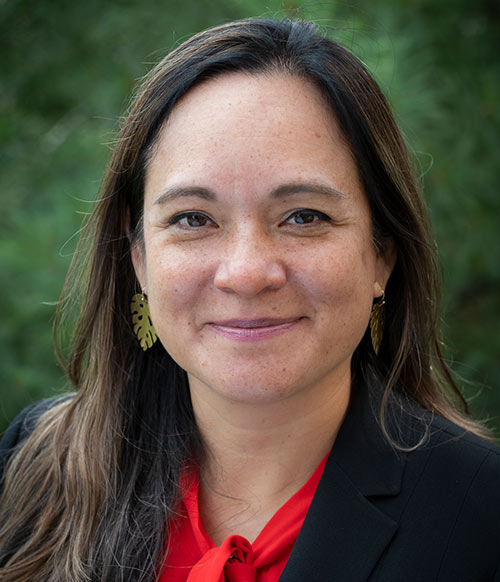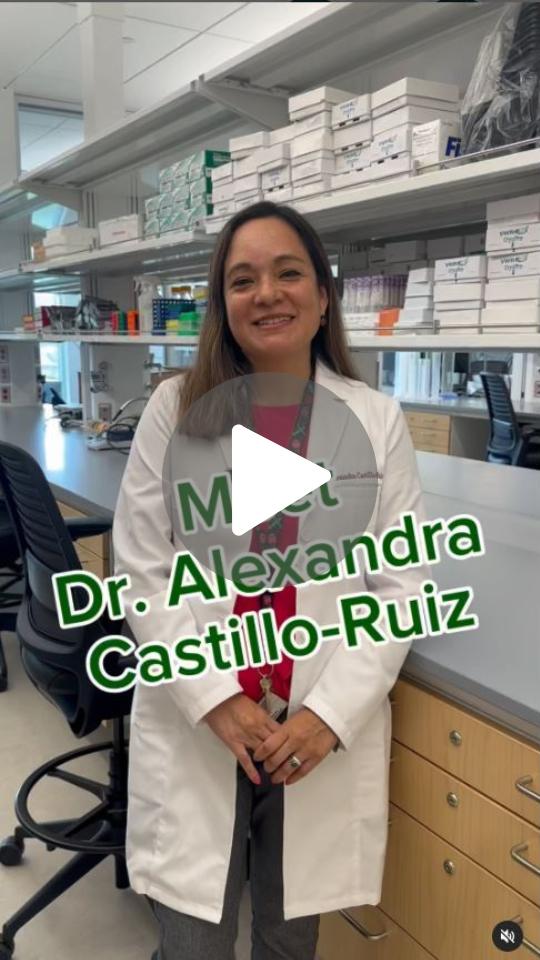Introducing New Behavioral Neuroscience Faculty Alexandra Castillo-Ruiz
October 8, 2024 - Shelly DeJong
 The Michigan State University Psychology Department welcomes Dr. Alexandra Castillo-Ruiz as a new assistant professor in the Behavioral Neuroscience research area.
The Michigan State University Psychology Department welcomes Dr. Alexandra Castillo-Ruiz as a new assistant professor in the Behavioral Neuroscience research area.
Originally from Lima, Peru, Castillo-Ruiz received her MA and PhD in Psychology from Michigan State University. She completed a postdoctoral fellowship at the University of Massachusetts Medical School and another at Georgia State University. Most recently, Castillo-Ruiz was a research assistant professor at Georgia State University.
Castillo-Ruiz's research focuses on the role that birth plays in brain and behavioral development. Her current research projects include investigating the effects of the microbiota and birth mode on brain development.
Castillo-Ruiz sat down with us to discuss her journey from being an MSU graduate student to now being a professor, why mentoring is important to her, and more!
Can you tell us a bit about your background?
I'm originally from Lima Peru, a middle class/low-income family, and I’ve always been very interested in how the world works and fascinated by animal behavior. Science is not as well supported in Peru as it is here, so I worked hard to find opportunities for more education. In Lima, I earned a bachelor's degree in biology with a minor in ecology, but I knew I wanted to study more about animal behavior and how the brain works. Through a work experience program, I came to Michigan to be a seasonal worker at Crystal Mountain Resort. That allowed me to save money for grad school applications and exams, and it gave me the opportunity to contact universities around the area that focused on animal behavior. I ended up connecting with Dr. Tony Nunez, who was a professor in MSU’s Behavioral Neuroscience program, and he told me about the opportunities to have a teaching assistantship with a stipend, and so I ended up coming to graduate school here at Michigan State University. I work hard through all aspects of my life, but I still can’t believe I was a student here and now I’m a professor. I’m so excited to be here.
Can you tell us about your research?
I study the effects of being born on the development of the brain. Birth is such a remarkable event for us. At the time of birth, we are squished through the birth canal, we experience low oxygen levels, and fascinatingly, we experience colonization by microbes. We are sterile when we're in the womb, but at birth we get the flora that is going to accompany us all our lives. In my work, I look at the impacts on brain development of manipulating that colonization by microbes and manipulating birth mode, meaning being born by c-section or vaginally. In my work with mice, I have shown that if you manipulate those microbes at birth, you can change the way the brain develops. I have also shown that being born by c-section also changes brain development, with long-term effects on brain structure. I am currently researching how those changes are taking place and whether they lead to long-term consequences for behavior.
I'm fascinated by anything related to birth, and I am particularly intrigued by the microbe aspect. It's fascinating that non-self-organisms living in and on us can affect how our brain is shaped and can ultimately affect the way that we behave and feel.
I also believe that this research is important because it shows how the event of being born helps to develop our brains. My research also has clinical relevance because c-sections are such a widespread practice across the world. In addition, it has been estimated that between 30 - 40% of women in this country are being treated with antibiotics around the time of birth, so we really need to understand the effects of manipulating birth mode and microbes on brain development.
What do you hope that your impact will be as a professor or in academia?
From the research perspective, I hope to establish a research program that is impactful in terms of discovering more about the role of birth. From the mentoring and teaching perspective, I hope to inspire younger generations of scientists to pursue research through my interactions with students as well as through outreach opportunities with the public. As a scientist, I believe it is my responsibility to communicate clearly and honestly with the public, informing them of what we’re doing and what we’re finding.
Outreach is and has been a key aspect of my life. I’m currently working on a children’s book that is about the importance of microbes in our lives and how we don’t need to be scared of them. I also volunteered with a school in the south side of Atlanta for two years through a STEM program with the organization Science Atlanta. There I worked with seven-to eleven-year-olds. I have also showcased my research work at local science events for the public of all ages in Atlanta. I loved being able to do outreach like that and I hope to continue having an impact in my community here as well.
Are you teaching classes this year?
Next semester I’ll be teaching Brain and Behavior—which I actually first taught when I was a graduate student at Michigan State. As a grad student, I was always interested in mentoring and teaching, so when I learned that there was the possibility for grad students to teach their own class, I fought for it. I first taught a small Brain and Behavior class during the summer, and then taught a class of 100 or so during the spring semester! I'm super thankful for all those opportunities because having teaching experience on my CV was helpful on the job market—and now I feel prepared and excited to teach this class again in the spring!
Can you talk about your interest in mentoring?
I think it's important that if you're running a lab, you shouldn’t see your students just as workers. You should prepare them for the research and professional aspects of their lives, paying special attention to their personal professional goals. For example, a student that is interested in graduate school has different needs than the student interested in medical school. I have had amazing mentors in the past that have gone the extra mile to help me, and I want to pay that forward.
One last question, can you tell us about your dog?
Wally is the Chief Well-Being Officer and Science Ambassador in my lab. He’s a 22-pound dachshund mix that my husband and I rescued after he was abandoned on the streets of Atlanta. He is the inspiration for my children’s book. He’s a good boy!


